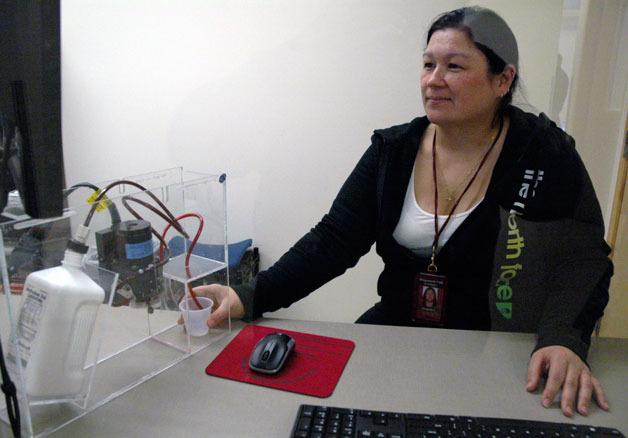ARLINGTON — Island Crossing Counseling Services is not a new service to the Island Crossing triangle owned by the Stillaguamish Tribe of Indians, but on Friday, May 31, the methadone clinic celebrated its official opening in its greatly expanded and improved facility.
Stillaguamish Tribal Chair Shawn Yanity recounted the history of Island Crossing in his people’s fight for their rights, crediting elder members of his tribe with stopping the centennial wagon train there in 1976 to read the Point Elliott Treaty.
“We’re still struggling, and one of our fights now is drug addiction,” Yanity said. “After a time, the original buildings for our first clinic here didn’t suit that mission. There are people hurting from this fight, and they needed a place that was a little more healing. They needed lifting up. Trying to be clean is not an easy road.”
Yanity warned that addiction exacts not only mental and physical tolls on those who are addicted, but also spiritual and cultural tolls on them and their loved ones alike.
“This doesn’t solve the whole problem, but we’ve got to put our feet forward and do something,” Yanity said. “This is a nest for those who need comfort.”
Jeremy Smith, facilities manager for the Stillaguamish Tribe, noted that the new facility boasts 10,000 square feet of space — including 20 offices, two examination rooms, two conference rooms, a nurse’s station and “miles” of Internet cable in the walls — for as many as 30 staff members, while Joanne Norton and Kelly Campbell, the director and business manager of ICCS respectively, agreed with Dr. Bill Dickinson, the clinic’s medical director, that its number of patients is currently just shy of 400, and is steadily heading toward the facility’s capacity of 500.
Those who wish to receive treatment at ICCS for opiate addiction must demonstrate that they are truly addicted, first through an initial assessment appointment that measures them against the criteria for opiate addiction, then by meeting with a doctor at the clinic to determine that they meet further criteria. In addition to receiving closely monitored doses of methadone — staff such as Lisa Sutherland, the clinic’s lead nurse, only dispense doses to patients after they’ve passed a thumbprint scan — all patients must meet for mandatory counseling sessions with multiple groups, and ensure that they have no financial issues either.
“It’s about relapse prevention,” Campbell said.
Dickinson echoed Campbell and Norton in noting that security personnel are ever-present, and touted the number of nurses, backup physicians and counselors who work as a team at ICCS.
“Methadone is one of the most highly regulated substances out there,” Dickinson said. “Both our clinical director and the medical director, me, have to be licensed for it, and we answer to the federal and state governments, as well as the DEA and the city, so we follow the rules to a T.”
When it comes to treating opiate addiction, Dickinson shares Yanity’s expressed sentiment that incremental improvement is better than no improvement at all.
“Our patients have to want to commit to treatment, including medication and counseling, but recovery also means going from a using lifestyle to a non-using lifestyle, and that doesn’t happen overnight,” Dickinson said. “By 180 days in, the treatment is just starting to make a dent, and it’s often a year and a half to two years before they stabilize.”
Dickinson sees his role as helping his patients improve their lives, to the point that they’re employable and having healthy relationships, with no legal or financial troubles, rather than forcing them to quit cold turkey.
“Addiction is the only place in medicine where we insist that people be completely off medication,” Dickinson said. “If you have high blood pressure or cholesterol, your doctor doesn’t tell you after a certain amount of time, ‘You’re still too high, so we’re cutting you off your meds.’ Ideally, you wouldn’t want to be on methadone at all, but if it’s a middle ground that helps you improve, then that’s better than using. It’s harm reduction versus total abstinence. Methadone is the most successful of all the methods of treatment. It has a 70 percent success rate. After long enough, most patients don’t even want to relapse, but changing your life takes time.”
For more information on Island Crossing Counseling Services, log onto www.stillaguamish.com/islandcrossing.asp.







